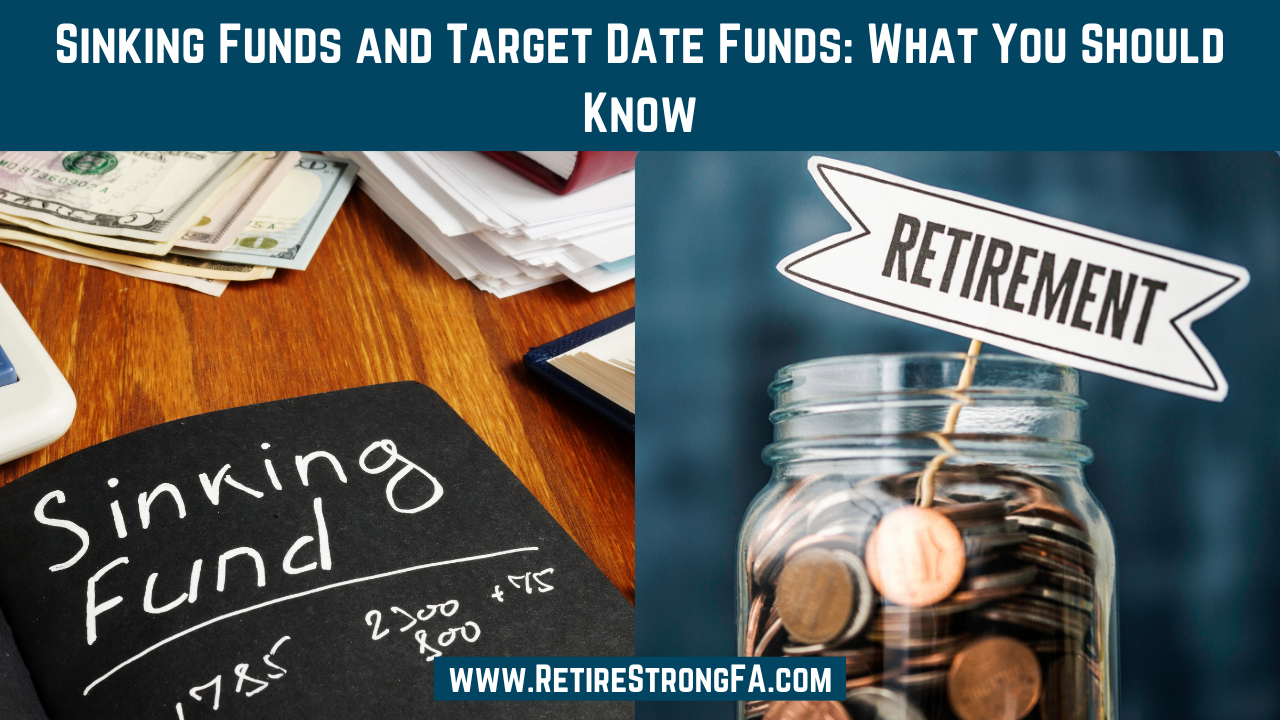
Retirement planning isn’t just about investments and Social Security; it’s also about how you budget and prepare for the expenses you know are coming. In this episode, I break down two essential but often misunderstood tools: sinking funds and target date funds.
First, I explore how sinking funds, popularized by the likes of Dave Ramsey, can help retirees avoid high-interest debt and budget for large, irregular expenses like vacations, home improvements, or even a future wedding.
I share personal examples and stories from my clients to show how setting aside money intentionally can be a game-changer, especially in retirement.
Then I shift gears to target date funds. They’re in nearly every 401(k), but are they really the best option for you? I will explain what’s “under the hood” of these cookie-cutter investment options, their pros and cons, and why one-size-fits-all may not fit your goals or risk tolerance.
I challenge you to go beyond age-based investing and build a portfolio that reflects your unique vision for retirement. Whether you’re still saving or already retired, this episode offers clear insights to help you plan smarter and spend more intentionally.
You will want to hear this episode if you are interested in…
- (00:00) Intro
- (00:45) Why I love sinking funds, and how to use them.
- (04:43) Budgeting for cars, vacations, weddings, and home repairs.
- (10:08) The big mistake retirees make when taking lump sums.
- (13:42) Breaking your retirement expenses into categories.
- (17:09) Target date funds: what they are and how they work.
- (20:32) Why not all target date funds are created equal.
- (24:41) The real disadvantages of cookie-cutter portfolios.
- (27:38) Why your retirement plan should reflect your personal vision.
Benefits of Sinking Funds
What Are Sinking Funds? Sinking funds are separate savings set aside for specific future expenses (like a car, vacation, home improvement, or holiday spending). Rather than relying on credit cards or loans when the time comes, these funds allow you to plan ahead and cover costs with cash.
Think of old-school “Christmas Club” accounts, where people saved a bit each month to handle holiday expenses without debt. The same principle applies to any upcoming expense. Open multiple savings accounts and save gradually and deliberately with individualized accounts.
Creating sinking funds is beneficial because they prevent financial stress and debt. You avoid high-interest loans or credit card charges. Anticipating your expenses allows for more flexible, strategic budgeting. Setting aside funds keeps your retirement funds intact when market conditions are poor and helps you avoid tapping into 401(k)s or retirement accounts at the wrong time.
Many retirees make the mistake of withdrawing lump sums from retirement accounts during market downturns. With sinking funds, you’re less likely to face that situation. Plus, you can work with your financial planner to plan for big expenses well in advance.
Retirement Funds AKA Target Date Funds Within 401(k)
Target Date Funds are retirement investment options often used in 401(k) plans, typically selected based on your year of birth and intended retirement age, most commonly 65. These funds automatically adjust over time, shifting from a higher concentration in stocks toward a more conservative mix with bonds as retirement nears.
While this approach seems practical and is widely adopted (Fidelity found that half of baby boomers in their 401(k) plans were invested in such funds) it comes with significant drawbacks. Why don’t I like these Target Date-Retirement Funds? Well, because they ignore individual risk tolerance, financial goals, and retirement vision.
Different fund providers offer drastically varied returns, expense ratios, and asset allocations, making consistency and performance unpredictable. Most notably, many of these funds allocate a large portion, often around 40%, to underperforming bond indexes and up to 25% to international stocks, which have historically lagged U.S. markets.
Retirement planning should be personalized, not a generalized “cookie-cutter approach.” Each client has individual financial goals (like captaining a fishing boat or traveling to national parks), and these require tailored strategies. The Target Date Funds create generalized portfolios based on age, instead of goals.
The takeaway is clear: while target date funds may offer simplicity, they often fail to deliver the customization needed for a truly successful retirement.
Resources & People Mentioned
Connect With Gregg Gonzalez
- Email at: Gregg@RetireSTL.com
- Podcast: https://RetireStrongFA.com/Podcast
- Website: https://RetireStrongFA.com/
- Follow Gregg on LinkedIn
- Follow Gregg on Facebook
- Follow Gregg on YouTube



